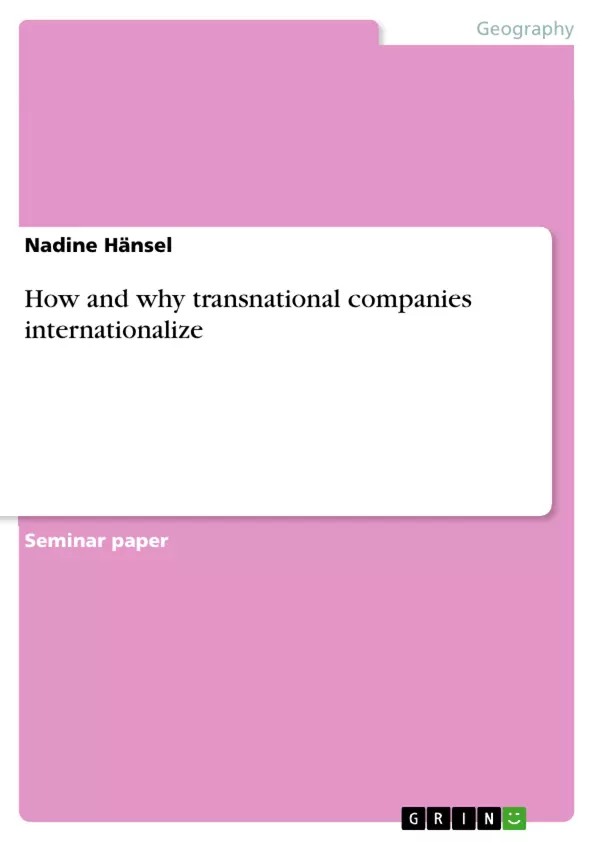The focus of this research paper will be on transnational companies (TNCs), which are not just doing business across borders, but rather have the individual characteristic of direct production and to a large extent also direct business activity in a foreign country. (Gillies: 2012) What strategies TNCs choose in order to pursue their target of directness will be demonstrated in this paper.
Table of Contents
- Introduction
- How firms internationalize
- The Product Life Cycle
- Different Ways of TNC progress
- Born Global Firms
- Why firms internationalize
- Market Access
- Lower Production Costs
- (Natural) Resources
- Transnational Strategy
- Case Study: Volkswagen
- Conclusion
Objectives and Key Themes
This paper explores the complexities of internationalization by transnational companies (TNCs). It aims to provide a comprehensive overview of the various factors influencing internationalization, including both traditional and contemporary perspectives. The paper seeks to address key questions such as:- What are the different ways in which firms internationalize?
- What are the key economic incentives driving firms to expand internationally?
- How can the internationalization process of TNCs be analyzed and understood?
Chapter Summaries
The paper begins by examining the traditional view of internationalization as a sequential process, exemplified by the Product Life Cycle (PLC) theory. The PLC theory suggests that firms initially focus on their domestic market and then gradually expand to international markets as their product matures. The paper then explores the limitations of the PLC theory, highlighting its inability to capture the diverse and complex realities of TNCs.
The paper then delves into various ways in which TNCs progress, emphasizing the more dynamic and multifaceted nature of internationalization. The analysis covers different approaches to internationalization, including the "born global" phenomenon where firms are established with global ambitions from the outset.
The following section examines the key economic motivations driving firms to internationalize. The paper explores various reasons, including market access, lower production costs, access to natural resources, and the adoption of transnational strategies.
Finally, the paper concludes with a case study of Volkswagen, examining the company's internationalization process in detail. This case study serves as a practical example of how a TNC can navigate the complexities of international expansion.
Keywords
This research paper focuses on the dynamics of transnational companies (TNCs) and their internationalization strategies. Key concepts explored include the Product Life Cycle (PLC) theory, born global firms, market access, lower production costs, natural resources, transnational strategies, and the internationalization process of TNCs.Frequently Asked Questions
What defines a Transnational Company (TNC)?
A TNC is a firm that doesn't just trade across borders but engages in direct production and business activities in a foreign country.
How does the Product Life Cycle theory explain internationalization?
The PLC theory suggests that firms first dominate their domestic market and then expand internationally as their product matures and production becomes standardized.
What are "Born Global" firms?
Born Global firms are companies that operate internationally from their inception, skipping the traditional sequential stages of expansion.
Why do companies choose to internationalize?
Main drivers include access to new markets, lowering production costs, securing natural resources, and implementing transnational strategies for global efficiency.
What can we learn from the Volkswagen case study?
The Volkswagen case illustrates how a major TNC navigates the complexities of global production networks and market entry strategies in different regions.
- Citation du texte
- Nadine Hänsel (Auteur), 2012, How and why transnational companies internationalize, Munich, GRIN Verlag, https://www.grin.com/document/211038



